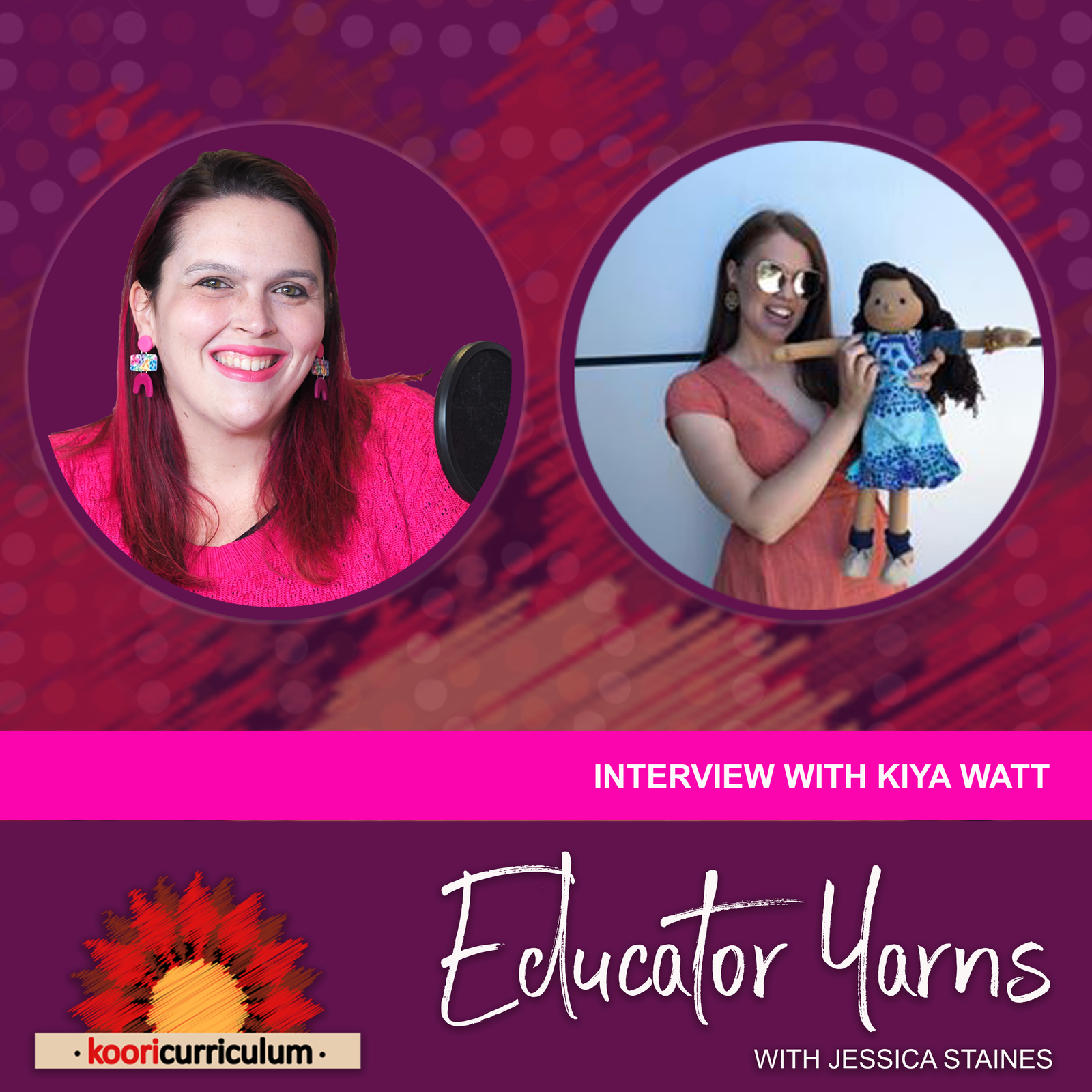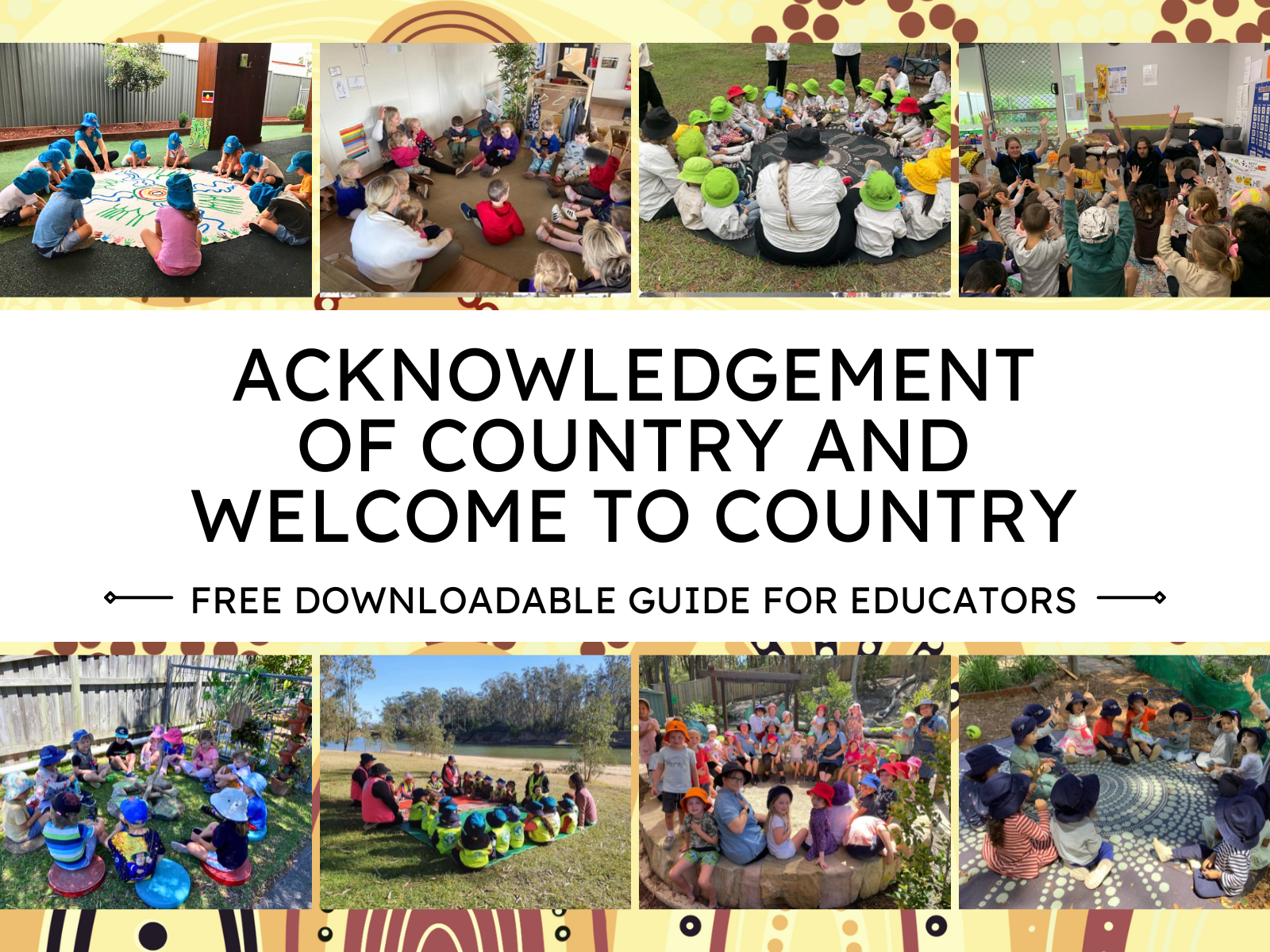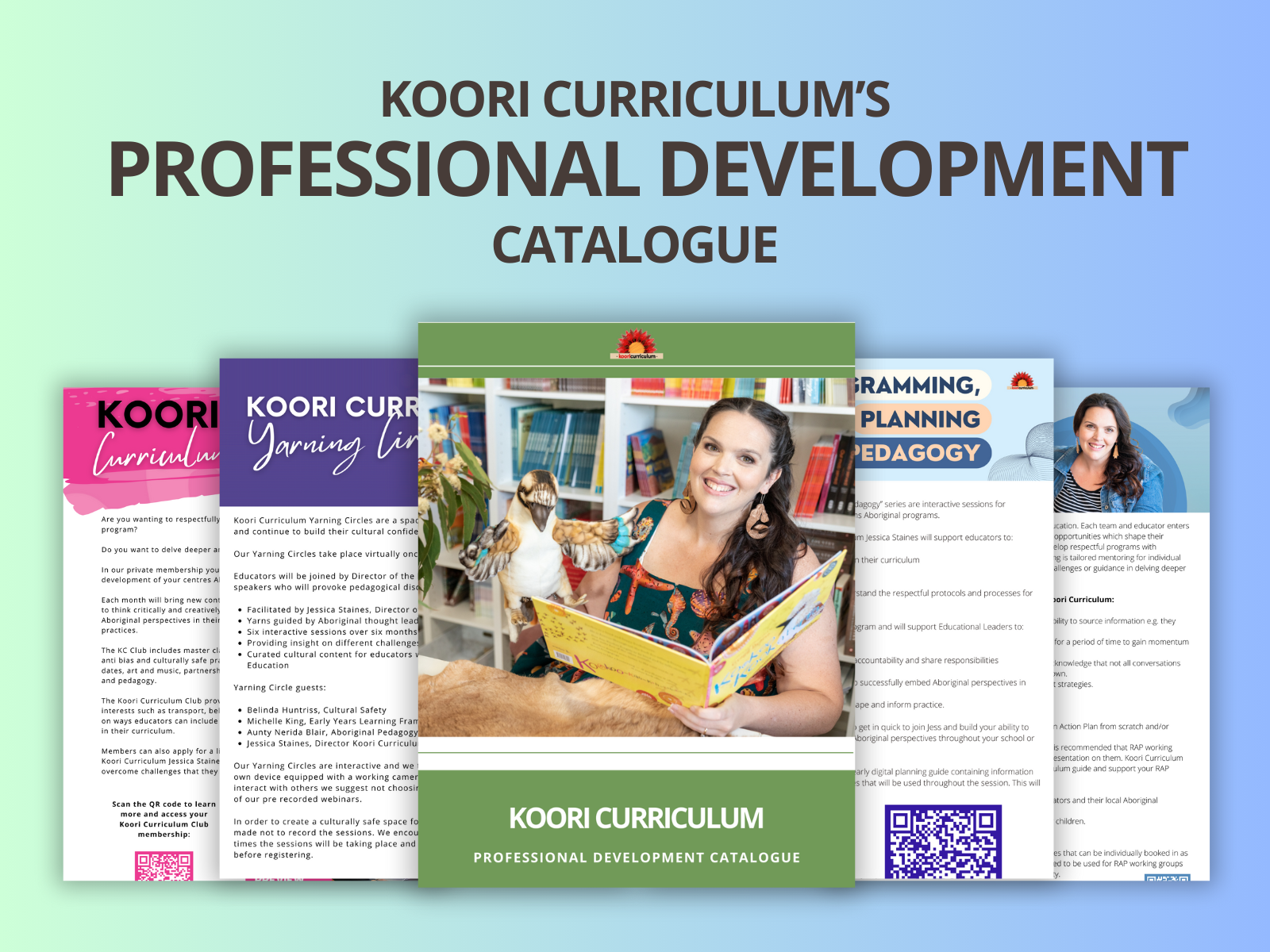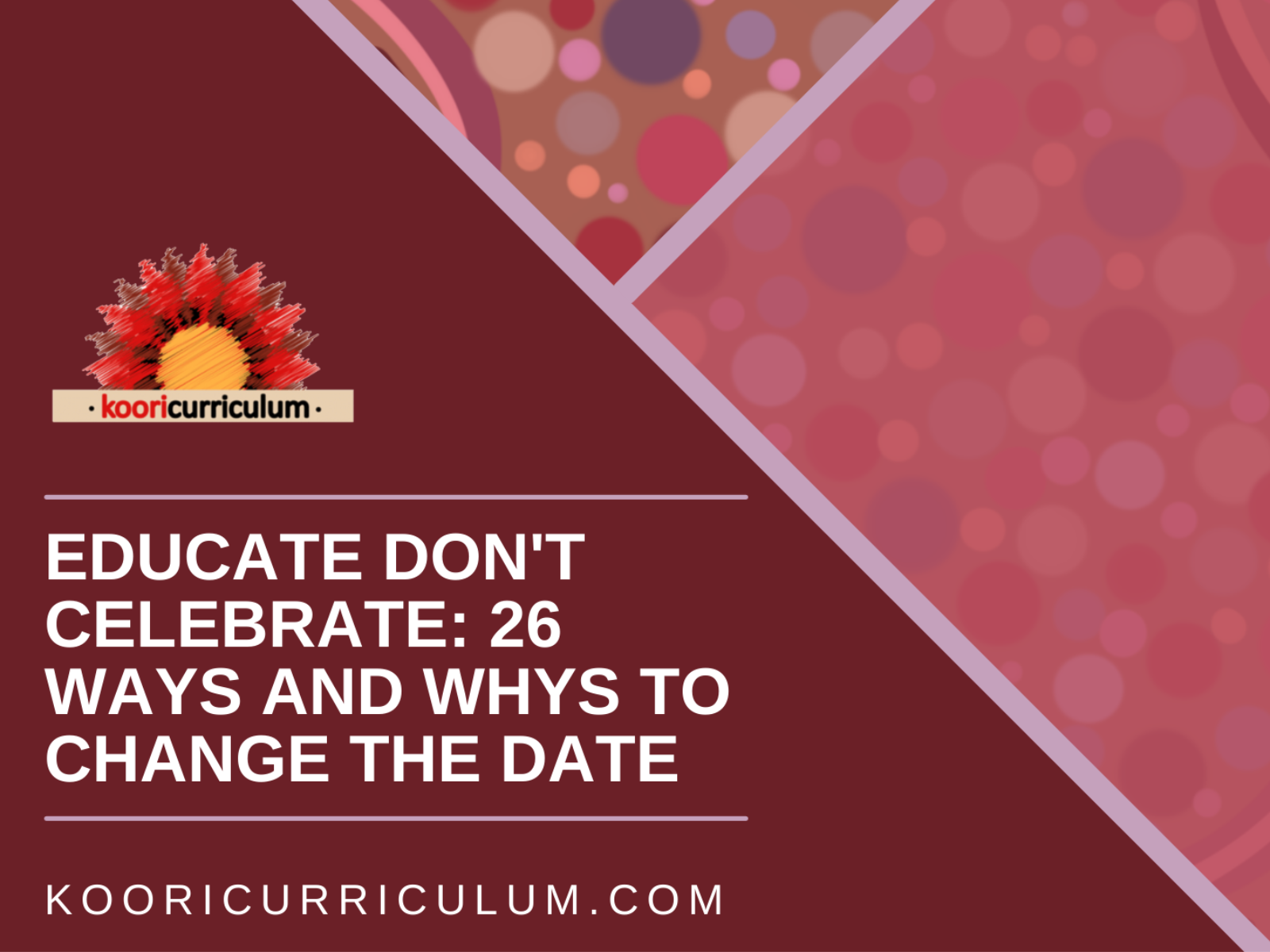
Educator Yarns Episode 17 - Interview with Kiya Watts
Complete show notes for Episode 17
Jessica Staines:
Welcome to the Koori Curriculum Educators podcast. My name is Jessica Staines, Wiradjuri woman, Early Childhood Teacher, and Director of the Koori Curriculum. I would like to acknowledge the Darkinjung people, the traditional custodians of the land on which this podcast is being recorded. I'd like to acknowledge the elders both past, present and emerging, and all Aboriginal and Torres Strait Islander listeners.
Jessica Staines:
You may have heard the exciting news, but over at the Koori Curriculum, we are running a NAIDOC art competition for children. This is in line with this year's theme: Always Was, Always Will Be. Schools, early learning services, or families are invited to make a submission via our website, www.kooricurriculum.com., that shows how they celebrate NAIDOC with the children in their homes or at their school, in line with this year's theme. You need to include some pictures and a rationale to go into the draw to win a $500 Koori Curriculum store prize. For more details, visit our website www.kooricurriculum.com.
Jessica Staines:
Hi Kiya, how are you going?
Kiya:
Hi, I'm good.
Jessica Staines:
I... Really excited that you're able to join us on the Educator Yarns Podcast. So for our listeners that don't know the famous Kiya Watt, can you just give yourself a brief introduction? Who's your mob and where you're from?
Kiya:
Yeah, my name's Kiya Watt, I'm a Menang, Gnudju, Noongar artist. I currently reside in Albany, and I did the art for the Kiya doll, so that's how I'm recognised as well. I've been doing art for a few years now, and a lot of other cool stuff.
Jessica Staines:
Yeah. And that's how we became connected, through the Play School acknowledgement of country episode where Kiya was born. And she's not the first Aboriginal doll on Play School, but she's the first Aboriginal doll that has an identity. And so her name is Kiya, she's named after her mama who designed her beautiful dress. And she's like your doppelganger almost. She's your twin.
Kiya:
Yeah.
Jessica Staines:
And I think it was really important for her to have that cultural identity and that sense of belonging, as it is with all Aboriginal people, that we're all connected to place.
Kiya:
Yeah. It's so important, and a lot of people say, when I say, "Oh, it's the first Aboriginal girl with a cultural identity," they're like, "No, it's not." But she is because she belongs to the Noongar people, and we're not just Aboriginal people, we belong to many different tribes. We have our-
Jessica Staines:
And I think Dan is also important, who was the first Aboriginal doll, because whilst he is an Aboriginal doll or character on Play School, he doesn't have that same cultural background and identity. And I guess that's reflective of a lot of Aboriginal people that have been displaced or removed from family during the stolen generation. So I think having both dolls together, and both genders represented, and different skin tones represented, we're moving more towards that real holistic representation of Aboriginal and Torres Strait Islander people on Play School. So we're becoming more progressive as time goes on.
Kiya:
Yeah, which is so important. It's just such a positive moment forward.
Jessica Staines:
So since then you've become busier and busier-
Kiya:
Yes.
Jessica Staines:
... And you've presented at award ceremonies, and you've designed some jewellery with House of Dizzy, you've done heaps of murals. What sort of projects are you working on at the moment?
Kiya:
So I am a part of a few different things, and I have a lot of projects going on. As Aboriginal people, we do a lot in our own communities. I'm a board member and director at the Noongar Centre and I do a lot of volunteering there. I'm also a part of a new corporation called Trading Black, which is just trying to stop cultural exploitation. I also work as an Aboriginal youth worker, slash drug and alcohol counsellor. And yeah, I just feel really busy right now. I'm doing a lot of things within community, and of course still doing art.
Jessica Staines:
Yeah, you're wearing lots of different hats. And I guess that your work with Trading Black is one of the things that I was really keen to talk to you about today. So I know that Trading Black, they have an Instagram handle as well. And one of their things is on Wednesdays, We Wear Black. And today being Wednesday, and I suppose people will listen to the podcast whenever they do, but I'm wearing earrings from Gillawarra Arts, and I'm wearing a hoodie from Yali Creative, and I'm wearing a shirt from Clothing the Gap. And I think we wear our culture in so many ways, but it's also about making sure that we're supporting First Nation businesses.
Jessica Staines:
Do you find that there's a lot of competition from non-Indigenous businesses that are falsely misrepresenting broader Australian public, that their merchandise is authentic when really it's not? Have you experienced that?
Kiya:
Yeah. A lot of community members have been quite shocked to find out that there are a lot of non-Aboriginal owned businesses, not being very transparent in their trading. And that's obviously a red flag, because when there's no transparency you've got to wonder what's the real intentions of trading in culture? So in Trading Black, we do educate people around these kind of issues that we face in the business sector.
Jessica Staines:
Yeah. And I think... So it's not wrong for non-Indigenous people or companies to sell Aboriginal products, but how do they do that in an ethical way, versus someone who's doing it in a disrespectful way? What's the difference between those two people?
Kiya:
Yeah. So I guess, at Trading Black, we love seeing collaborations and non-Aboriginal people really helping and being allies, but ultimately we want... Aboriginal people, we are leaders, we don't need to be led. And when we have these agencies, what we need to see is succession planning. So yes, some businesses are trading and they really want to help these artists that are struggling, or they don't know how to get on social media and promote and network and all that, and marketing. But what we want to see is these agencies and businesses actually hand over their skill sets that they've learned so that these artists can then make their own businesses, or sell their own art and make a hundred percent of the profits.
Kiya:
So yeah, a hundred percent, it's not wrong when there are businesses that are here to help, because there is a lot of amazing businesses that are, but we just need to see that accountability that we as Aboriginal people have to our communities, and the only way to a hundred percent guarantee that is by empowering our artists and people working beneath us to have their own businesses.
Jessica Staines:
Yeah, I agree. So it's this idea that non-Indigenous people and non-Indigenous companies can, of course, employ and sell Aboriginal... Well, they can employ Aboriginal and Torres Strait Islander staff, and they can sell Aboriginal and Torres Strait Islander made products and so forth, or they can employ a designer or something to design clothes. So I know Gorman clothing has a really good relationship with several regional art centres, where they're designing this season's fashion label and all that sort of stuff. And I think that works really well when those organisations are part of associations like the Aboriginal Arts Association, or they're [crosstalk 00:08:26] with the Indigenous Arts Code, because that at least gives me some peace of mind that the artists are being remunerated appropriately for their work.
Kiya:
I guess, I myself personally, I don't agree with employing Aboriginal artists, unless there is a contract that makes them the owners of their copyrights to their art. That's a huge thing for me. I think it's very important that as artists, we own the cultural and intellectual copyrights to our art. But when there's these contracts in place and it is about empowering mob, then a hundred percent, I support that.
Jessica Staines:
Yeah. And so I think that's one of the things that I would definitely agree with you, is that whilst I give you permission to use my art on the front cover of your book, you don't own my artwork.
Kiya:
Yes, yeah.
Jessica Staines:
So if all of a sudden you want to turn that into a calendar, or a sticker, or a bed quilt, you need to come back to me, and that's separate. I always hold the agency over how I want my art to be used. So it's not... You're not signing over all your rights. Because I know, for example, with the beautiful Kiya doll, the design that you did, that artwork's really special to you and your family.
Kiya:
Yeah. Yeah. It's really special. So it's just, I think, a really important thing as well. And I guess a lot of people, you know how they go to buy from Bali, and I've been told that a lot of non-Aboriginal people aren't educated about our art, that it's actually not just like dots and lines. It's connected to our dreaming, it's connected to our language, and it's very sacred so we've always got to tread carefully around being respectful of that.
Jessica Staines:
Yep. So for Aboriginal businesses though, sometimes educators will ask me... Because I think it's become more and more common for early learning services to think about wearing Aboriginal design shirts as part of their uniform, or that sort of thing. And so often they'll ask me, "Is it okay if we buy from a non-Indigenous brand?" They pay their royalties really well to the artists, and all that sort of stuff. And I think, look, definitely if they're paying royalties and there's real transparency, that they're upfront and they say, "Look, I am non-Indigenous. I'm a non-Indigenous company, and we work collaboratively with these artists, and this is who they are, and these are their stories, and we pay X amount of royalties, and we're really supportive of their professional development and their professional growth."
Jessica Staines:
And there's a real story about their brand, and how they're supporting community and the individual growth of artists. I think those people are fine, but when there's no transparency or they use misleading words, like, "Inspired by," you know?
Kiya:
Yeah, yeah.
Jessica Staines:
That sort of thing, I think, "No, no, no." It has to be up front and centre, who you are, what you're about and what you do. And always, if you don't know the artist's name and the story that's being told, that's a huge red flag that something isn't right, in my opinion.
Kiya:
Yeah, yeah. A hundred percent.
Jessica Staines:
However, I really strongly believe that whilst there is a space for non-Indigenous businesses, you should first always try and find an Aboriginal or Torres Strait Islander business that you can support directly. You know? That-
Kiya:
Yeah.
Jessica Staines:
Yeah.
Kiya:
And Trading Black is not about saying, "Oh, don't buy from these people." But it's just saying, if there's no transparency like you said, a hundred percent, then let's go towards buying directly from Aboriginal people themselves, or artists or business owners, because we know a hundred percent that it is ethical. And when these businesses that aren't Aboriginal owned, they're very transparent and they are giving back to community, of course you can wear their merchandise, and you just have to be sure.
Kiya:
And that's where Trading Black is good, because we are educating and sharing businesses that we know are great ally businesses, and then Aboriginal owned businesses as well to support.
Jessica Staines:
Yeah, exactly right. So how do we find a database of Aboriginal fashion labels and businesses? So is it through the Trading Black website or are there other places that we can look?
Kiya:
Yeah, so the website will be developed very... It's in the making. We've also got a membership page that's just started up on Facebook, where people just have to fill out a few questions, and then they can be directed into our page where we promote businesses that are Aboriginal owned, your fashion businesses, all different areas of different Aboriginal owned businesses. And then we'll also on the website have a registry where people can directly look up who's Aboriginal owned, which businesses work in fashion, et cetera, like that.
Jessica Staines:
Yes. So I think Trading Black is a really good resource, and I follow Trading Black on Instagram, and they're always sharing different Aboriginal businesses, fashion labels, as well as all other aspects of business as well. So I would recommend following that Insta handle. But as well as that, I think Supply Nation is really good, which is a bit of a business data directory, where... And I think that's one of the things that I really... People always say, "Well how can you work out if they're an Aboriginal business or they're not an Aboriginal business?"
Jessica Staines:
So for me I always look... Your members of the Indigenous Arts Code, the Aboriginal Arts Association, although non-Indigenous people can be part of both of those as well.
Kiya:
Yeah.
Jessica Staines:
But thirdly to that, if they are registered with Supply Nation, then that means that all the checks are done. And even though I hate that a mob are made to produce their Aboriginality certificate, I think that it's problematic, but I know myself, I'm registered with Supply Nation. And you have to go through a process of proof of identity, and rightfully so, because there are some people that would otherwise take advantage of that and do it.
Jessica Staines:
And so, all the businesses that are on the Supply Nation website, we know that they've gone through a rigorous checking process to make sure that they're not Gammon, you know? That-
Kiya:
Yeah. And it is a guarantee, yeah. Yep.
Jessica Staines:
Exactly, exactly right. So the other question, I guess, that people always ask me, is it wrong for non-Indigenous people to wear Aboriginal designed t-shirts and merchandise?
Kiya:
Yeah. So that's a question we get sent into Trading Black a lot. And we always say, "Yes, we want allies to support our businesses." We only make up 3% of Australia, so we need allies to support us, buy our products, buy our merchandise. And at Trading Black we have an initiative called We Wear Black on Wednesdays, which is actually calling for allies and Aboriginal mob to wear an Aboriginal owned product or shirt, earrings, whatever it is, post it, use the hashtag We Were Black on Wednesdays, and then we will repost it to our page as well.
Jessica Staines:
Yeah, definitely. And I myself do that. So earlier, I think you cut out when I was saying this, but today I'm wearing my Gillawarra Art earrings, which are made from quandong seeds, all different colours.
Kiya:
Oh, that's awesome. Yeah.
Jessica Staines:
I'm wearing my Black Lives Matter hoodie, which I got from Yali Creative, and my Clothing The Gap shirt, Always Was, Always Will Be, this is NAIDOC, themed shirt. And I mean, look, we wear our culture really proudly all the time, but I think that support... And I think there are some shirts that are more appropriate for mob to wear. So there's a there's a brand that-
Kiya:
Yeah, exactly. Yeah.
Jessica Staines:
... That says, "It's in my DNA," you know? So obviously if you're not Aboriginal it's not in your DNA, so probably not the shirt for you. But most of the time there's really great, different shirts. And I think the thing is as well, that there's always artists like yourself, so early learning services can reach out to you and if they want to talk to you about their service, then you might be able to make a custom designed artwork that's in their preschool foyer, that potentially you could work with them to turn that into a bespoke shirt just for their service, or just for their company and brand.
Jessica Staines:
And I think that's really nice not just to have something generic, but have a story that is reflective of who you are about, and your philosophy, and all that sort of thing. So I always like-
Kiya:
Yeah, a hundred percent I agree with what you're saying, because I kind of forgot. And a lot of businesses will, if it's for mob, and it says, "In my DNA," they'll say, on the websites, this is for mob. Or otherwise... I know Clothing the Gap, they have on their website... I'm pretty sure this is for everyone, Always Was Always Will Be, you can support and wear it and stand in solidarity with us. But yeah, if it's like you said, "In my DNA," that is not really appropriate.
Jessica Staines:
Yeah. I've got another shirt from Baddon Clothing, which is straight out of Wiradjuri. So obviously, you know? So-
Kiya:
Yeah. But even I couldn't wear that, you know?
Jessica Staines:
Yeah. .But there's so many amazing companies, and I made a little PDF that has my top 10 Aboriginal fashion labels that I support, which I'm going to make available to the listeners of this podcast.
Kiya:
Awesome.
Jessica Staines:
But do you have some favourite labels that you like to wear or you'd like to give a shout out to?
Kiya:
Yes. I absolutely love Nungala Creative, Clothing the Gap, BW tribal, I've collaborated with them on their new NAIDOC merch, and yeah, I absolutely love them. Also, there's so many. Take Pride Movement, just so many that I love and just a hundred percent vouch for. And who else is there?
Jessica Staines:
I think House of Dizzy, you did your Noongar season earrings with her, like the whole set?
Kiya:
Yeah. And that was really special. She is amazing to work with, and it was just an amazing collaboration. I have also collaborated with Deadly Denim.
Jessica Staines:
Oh, yes. I love Deadly Denim. I've Ginny's Girl Gang hoodie, which has, "I pay my respects to the traditional owners" at the back.
Kiya:
Oh my God, yes. I literally live in that jumper, I love it so much.
Jessica Staines:
Yeah, same. And then I got to Deadly Denim one. So Deadly Denim, for people that don't know, essentially they go to op shops and find denim jackets, and they repurpose them and they put beautiful Aboriginal print textiles on the back. So I really like the message that it's recycling, repurposing, saving perfectly fine coping items from landfill, and celebrating culture. And yeah, I think what they stand for is really cool. Really cool.
Kiya:
Yeah. Rebecca is amazing, yeah. And she's very passionate and gives back as well, so it's just... All those brands are amazing. And like I said, Trading Black has a whole list of Aboriginal brands, and as well, you can jump onto Supply Nation to check them out.
Jessica Staines:
Yeah, absolutely. Well, thanks so much Kiya for jumping on and yarning with me about Aboriginal fashion, and trying to work out the authentic from the fake, because I think for so many educators, they would hate to feel that they are supporting the Aboriginal fake art trade, because it absolutely cripples community. And for myself even, we're halfway through an online conference this week, and we got a whole heap of children's books in by Aboriginal authors, and we support Aboriginal publishing companies, and we put together lesson plans and talk about all the wonderful ways that you can use them.
Jessica Staines:
And we put that out into this audience that we've recruited through marketing and advertising, and then someone says, "Oh, don't buy from Koori Curriculum. You can get it for $5 at Aldi." And I think that happens constantly, not just my experience. And I'm here, and I think I've done all this work, and I've promoted and I've advertised and I've talked about how to use it. And I've put my heart into it because I really believe in this book and the stories and so forth, but the thing is, there's no way I could ever compete with Aldi prices because I can't afford to buy 2000 copies of one book to then get the cheap prices. We don't even buy them in for $5 ourselves, as wholesalers, you know? So we can't even get them ourselves for that. And I think that happens a lot with Aboriginal art.
Kiya:
Competing, yeah.
Jessica Staines:
People go, "I can get it from the Reject Shop, or I can get it from Hot Dollar or something like that." Or Paddy's Markets where it's all knock-off, fake stuff. But it's not authentic, and people need to think about where their money is going and who they are supporting, and I guess, who's affected at the end of it. So I always say to people like, "Sure. We all love shopping at Kmart and getting our Kmart fix, and you can get so much stuff for really cheap, but at the end of the day, what is the process of stuff? Who is suffering at the end of that?" It's just about the ethics of your purchasing and your procurement. It's more than just the resource, it's who you're supporting and self-determination and so forth. The story of the product behind it, in different ways.
Kiya:
Yeah. And empowering our next generation as well, making sure that they can come up and they will be looked after. So it's just so important that we support Aboriginal owned businesses, and Aboriginal people, really calling for transparency and authenticity. The thing you're talking about is a huge issue in communities, and business owners having to compete with brands like Aldi and that, that sells stuff for so cheap. And that's what we're trying to send out, that message. So yeah, thank you so much for having me on here.
Jessica Staines:
Yeah. Cheers man, thanks for coming on. And we'll get you back on regularly, I think, to talk about different things, because another time I'd love to talk to you about racism. So that's my next topic that I think I'm trying to feel out, and I know you've had experience with that, and particularly with the Black Lives Matter movement and trolling on websites, and all that sort of stuff. So you're just a powerhouse, and you're doing so many great things for community, and you're paying it forward now and really trying to help up and coming artists. So I'll link your Instagram handle in the notes of this episode so people can follow your journey. Thanks so much for coming on.
Kiya:
Awesome. Thanks Jess.
Jessica Staines:
Bye.
Jessica Staines:
Thanks for listening to today's podcast, to find out more information about the Koori Curriculum and how we can best support you and your early learning service, visit www.Kooricucurriculum.com.



